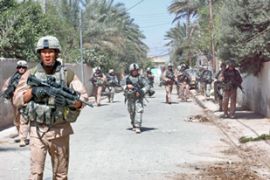‘Iraq fighters killed’ in US attack
Seventeen suspected al-Qaeda fighters killed in a helicopter attack near Baquba.

Brigadier-General Mick Bednarek, commander of the operation, said: “It is house to house, block to block, street to street, sewer to sewer.”
Bednarek estimated that several hundred al-Qaeda fighters were in Baquba and it would take a long time for US forces to force them out.
“They will not go any further. They will fight to the death,” he said.
“There have been houses that were used by al-Qaeda as safe houses … their entire structures rigged with massive explosives.”
US and Iraqi forces have amassed in the area after a four-month-old US-led security crackdown in Baghdad and operations elsewhere prompted many al-Qaeda members and other fighters to seek sanctuary in Diyala.
The campaign is part of a broader offensive involving tens of thousands of US and Iraqi soldiers pushing on with simultaneous operations in Baghdad, and to the south and west of the capital.
Torture house
Bednarek said US forces were making some grisly discoveries as they scoured Baquba.
He said residents led soldiers to a house in the western part of the city that appeared to have been used to hold, torment and kill hostages.
“When you walk into a room and you see blood trails, you see saws, you see drills, knives, in addition to weapons, that is not normal,” he said.
One US soldier has died during the offensive in Diyala.
Bednarek said the fight in Diyala also involved local Sunni Arabs who opposed the US but who wanted to end al-Qaeda domination of their communities.
He said this included fighters from the 1920 Revolution Brigade, a large Sunni Arab group that has fallen out with al-Qaeda over its killing of civilians.
US military commanders have increasingly begun arming and equipping Sunni Arab tribes in a controversial move to combat al-Qaeda under a model first used in the western Anbar province.